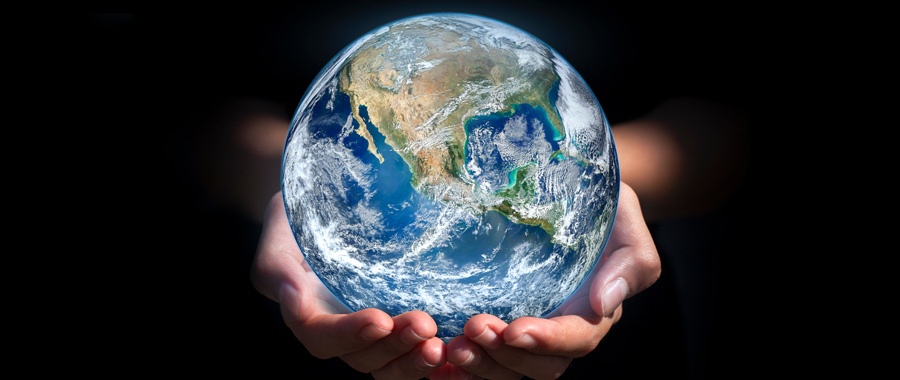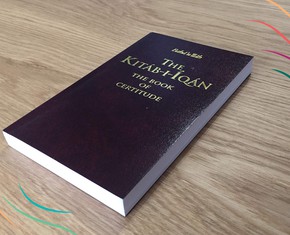The views expressed in our content reflect individual perspectives and do not represent the authoritative views of the Baha'i Faith.
Could humanity’s evolution possibly have come about in a completely random way, or have we had some form of transcendent help in our evolutionary ascent?
Science has provided us with some interesting insights into that question. For the vast majority of known human existence, which most scientists estimate at 300,000 years or thereabouts, homo sapiens used simple stone tools and lived fairly rudimentary lives. They lived in nomadic, family-centered hunter-gatherer bands, and probably had limited contact with one another outside of those small groupings.
But about 40-50,000 years ago, something striking and unprecedented happened – human beings began to evolve much more rapidly.
Scientists call the pronounced changes of that period the “Upper Paleolithic Revolution” because it likely marks the first widespread evidences of artistic creation, the formation of organized human settlements and the emerging development of complex, abstract language skills. Some scholars have concluded that human cooperation began at this point in pre-history, when the Earth’s limited population of people started to increase sufficiently to bring early humans into more frequent contact with each other.
So, did those expanding cultural and behavioral traits – language, art and music, complex symbolic thinking, technological creativity and the clear archeological evidence of abstract and mystical belief systems – develop spontaneously? Or did they come, as the Baha’i teachings say, from the influence of a divine educator?
Were it not for an educator, the means of comfort, civilization, and human virtues could in no wise have been acquired. If a man is left alone in a wilderness where he sees none of his own kind, the will undoubtedly become a mere animal. It is therefore clear that an educator is needed. …
This educator must undeniably be perfect in every way and distinguished above all men. For if he were like others he could never be their educator … he must so educate human minds and thoughts that they may become capable of substantive progress; that science and knowledge may expand; that the realities of things, the mysteries of the universe, and the properties of all that exists may be revealed; that learning, discoveries, and major undertakings may day by day increase; and that matters of the intellect may be deduced from and conveyed through the sensible. …
It is clear, however, that mere human power is incapable of fulfilling this great office, and that the results of human thought alone cannot secure such bounties. … A divine and spiritual power is therefore needed to enable him to carry out this mission. … the universal Educator must be at once a material, a human, and a spiritual educator, and, soaring above the world of nature, must be possessed of another power, so that He may assume the station of a divine teacher. – Abdu’l-Baha, Some Answered Questions, newly revised edition, pp. 9-12.
Every human culture, the Baha’i teachings explain, receives a divine educator:
Give ear, O My servant, unto that which is being sent down unto thee from the Throne of thy Lord, the Inaccessible, the Most Great. There is none other God but Him. He hath called into being His creatures, that they may know Him, Who is the Compassionate, the All-Merciful. Unto the cities of all nations He hath sent His Messengers, Whom He hath commissioned to announce unto men tidings of the Paradise of His good pleasure, and to draw them nigh unto the Haven of abiding security, the Seat of eternal holiness and transcendent glory. – Baha’u’llah, Gleanings from the Writings of Baha’u’llah, pp. 144–145.
Of course, that distant time in human pre-history, long before the emergence of written language or records, has left us no trace of the names or teachings of those earliest educators. So how do we know they actually existed? We can tell, the Baha’i writings say, by their fruits:
Just as a spotless mirror receives the rays of the sun and reflects its bounty to others, so too is the Holy Spirit the mediator of the light of holiness, which it conveys from the Sun of Truth to sanctified souls. This spirit is adorned with all the divine perfections. Whensoever it appears, the world is revived, a new cycle is ushered in, and the body of humanity is clothed in a fresh attire. It is like the spring: When it arrives, it transports the world from one condition to another. For the advent of springtide the black earth, the fields, and the meadows become green and verdant; flowers and sweet-scented herbs of every kind spring forth; trees are endowed with a new life; wondrous fruits are produced; and a new cycle is inaugurated.
It is the same with the manifestation of the Holy Spirit: Whenever it appears, it invests the world of humanity with a new life and endows human realities with a new spirit. It clothes all existence with a glorious attire, disperses the darkness of ignorance, and causes the light of human perfections to shine resplendent. – Abdu’l-Baha, Some Answered Questions, newly revised edition, pp. 163-164.
At those points in human history when significant leaps of evolutionary progress occur, the Baha’i teachings suggest, we can retrospectively identify the long-term effects of a yet another divine message and its profound impact on human civilization:
Man, then, is in extreme need of the only Power by which he is able to receive help from the Divine Reality, that Power alone bringing him into contact with the Source of all life.
An intermediary is needed to bring two extremes into relation with each other. Riches and poverty, plenty and need: without an intermediary power there could be no relation between these pairs of opposites.
So we can say there must be a Mediator between God and Man, and this is none other than the Holy Spirit, which brings the created earth into relation with the “Unthinkable One”, the Divine Reality. – Abdu’l-Baha, Paris Talks, p. 59.
















Comments
Sign in or create an account
Continue with Googleor